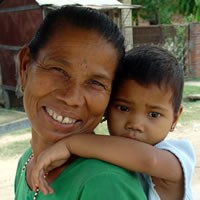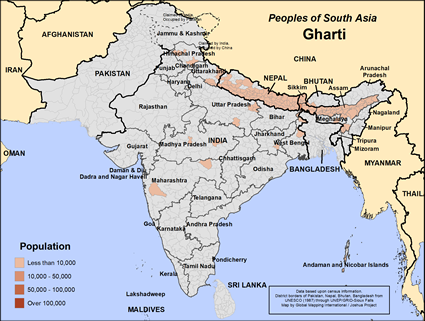Gharti in India

Photo Source:
Copyrighted © 2026
Isudas All rights reserved. Used with permission |

Map Source:
People Group data: Omid. Map geography: UNESCO / GMI. Map Design: Joshua Project.
|
| People Name: | Gharti |
| Country: | India |
| 10/40 Window: | Yes |
| Population: | 24,000 |
| World Population: | 147,000 |
| Primary Language: | Bengali |
| Primary Religion: | Hinduism |
| Christian Adherents: | 3.90 % |
| Evangelicals: | 1.36 % |
| Scripture: | Complete Bible |
| Ministry Resources: | Yes |
| Jesus Film: | Yes |
| Audio Recordings: | Yes |
| People Cluster: | South Asia Hindu - other |
| Affinity Bloc: | South Asian Peoples |
| Progress Level: |
|
Introduction / History
The Gharti, (or Bhujel) are a Hindu people who live in Nepal and India. They consider themselves an offshoot of the Indian Chetti. The Chetti are the warrior class of Nepal. The Chetti make up the famous Gurkhas soldiers who have served with distinction in the British Army. The Gharti served royal families and nobles as slaves, palanquin-bearers (an enclosed litter), and water-carriers. Traditionally, the men were palanquin-bearers and the women water-carriers, but today most labor on farms.
Illiteracy is a problem for the Gharti. Their children often must quit school early and work along side their parents in the fields. Most Gharti live in poverty without access to modern conveniences like electricity and indoor plumbing.
The primary languages of the Indian Gharti are Bengali and Nepali. Whole Bibles and the JESUS film are available in both languages.
Where Are they Located?
The large majority of the Gharti people live in Nepal, but smaller numbers are scattered throughout India. Most Indian Gharti live in the states West Bengal, Sikkim and Assam.
What Are Their Lives Like?
The Gharti are part of the Sudra, the fourth caste of manual laborers. Most Gharti work in agriculture today. Some own land but others labor on land owned by higher castes. Most live in multi-caste, rural villages. Some sell handmade items such as bamboo mats and baskets at markets. They sell vegetables and fruit they grow in family plots of land.
The Gharti marry within their group. Families arrange marriages with the consent of the young people. Sons inherit property with the eldest son becoming the head of the family upon the death of his father. Gharti hire Brahmin priests to perform at important family rituals such as births, weddings and funerals.
In additions to being farm workers, some Gharti men are employed as security guards and shopkeepers. Some women work as domestics for wealthy people.
The main foods of the Gharti are rice, wheat, vegetables and fruit. They are not vegetarians but as Hindus they do not eat beef. Meat and fish are often reserved for holidays and festivals.
What Are Their Beliefs?
The primary religion practiced by the Gharti is Hinduism, the predominant religious tradition of the Indian subcontinent. The Gharti people, for example, worship Hindu deities such as Kali, Lakshmi and Kanchyaga. Hindus believe that by performing rituals and good works that they will attain moksha or freedom from the endless cycle of birth, death and rebirth. The Gharti visit Hindu temples and offer prayers, food, flowers and incense to their gods. There are many forms of Hinduism, each with its own deities and beliefs. The main yearly holidays of the Gharti people are Holi, the festival of colors, Diwali, the festival of lights, Navratri, the celebration of autumn and Rama Navami, Rama's birthday.
There is a tiny number of Gharti who have become believers.
What Are Their Needs?
The Gharti need help in educating their children so that they can escape their cycle of poverty. The Gharti need to learn new job skills so that they can become a part of modern India. Most of all the Gharti need to hear and understand the life-changing gospel of Jesus Christ who alone can forgive their sin and give them new life.
Prayer Points
Pray for gospel workers to catch a vision for reaching the Gharti people in India for Jesus and that in God's sovereign timing their hearts would be open and ready to follow Him.
Pray for Jesus movements to bless extended Gharti families so the gospel will spread rapidly among this people group in both India and Nepal.
Pray for the spiritual lives of the Gharti people to become fruitful as they follow Christ.
Pray for the lives and culture of the Gharti people to evidence the rule and reign of the Kingdom of God as they open to the gospel, and for the beauty of Jesus to be seen in them.